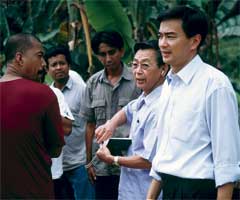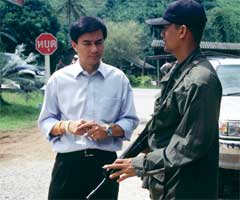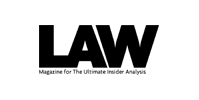| |
For many, the coup on the night of September 19, 2006
has completed yet another cycle of Thai politics. Many
will be tempted to see this as just a rerun of the longstanding
conflict between democratically elected politicians and
autocrats represented by the military. Like so many
“emerging” democracies, there is a sense that the country
could still not get to grips with the challenges of democratization.
What will it take for Thailand to avoid future
extra-Constitutional changes?
Yet despite the similarities between the numerous coups in
Thailand’s political history, one can see that democracy
progresses, albeit not in a smooth fashion. Elected governments
are now the norm, and those appointed by the coup
leaders the exception – the reverse of the situation four or
five decades ago.
While every coup is inevitably followed by attempts to roll
back some of the democratic progress, it has become harder
for coup leaders to do so. Constitutionalism, elections
and political parties are expected to be restored. Over the
years, the democratic political process has become part of
people’s lives at all levels. With more stable governments,
party policies have become more tangible. The problem is
that such progress is no guarantee against coups. If the
democratic process is expected to produce governments, it
is still not able to remove them when certain conflicts
arise. It should be noted that few coups are aimed at abrogating
the Constitution. The latest coup is no exception.
Indeed, it is ironic that to oust Thaksin from power, the
coup leaders had to tear up the Constitution that
Thaksin’s opponents wanted to protect from his abuse.
Now the country needs not only to return power to the
people quickly, but also to draft a Constitution that would
lay the foundations for a better democracy. She can only
do so by reviewing the past and identifying both the
strengths and weaknesses of previous Constitutions. She
must also recognize present economic and social circumstances-
global and local- and anticipate future trends.
The 1997 Constitution provides an important benchmark.
It was a product of a drafting process that was
uniquely democratic and participatory. It was also very
progressive in substance, incorporating such concepts
as direct democracy, decentralization, and extra-
Parliamentary mechanisms to enhance accountability. It
was highly unfortunate that a set of unique circumstances
led to widespread abuse of the document so that by the
time of the coup, its spirit had been almost totally
violated. While containing some flaws, one should recognize
that its spirit and objectives are still what the country
needs today. Hence the drafting of the new Constitution
should build upon the 1997 Constitution by using the
following principles.
First, the new Constitution should further strengthen the
provisions on people’s rights and participation as well
as create the necessary mechanisms for their protection.
Anything short of doing so will put the country out of
step with the reality of the changing world. The key is to
ensure that we have a limited government. Hence there
must be provisions to protect the media, honest civil
servants, activists, and ordinary people from interference
and violations of rights by the State. These are the basic
foundations of a democratic society. The last five years had
seen a steady erosion of these because an elected leader
thought the people had given him unlimited power. A
partisan media, a politicized civil service and general
intimidation of political opponents, not to mention severe
violation of rights in the form of extra-judicial killings,
meant there could never be meaningful participation or
political competition.
Second, impartial and strict enforcement of the law is
vital. If those in power feel they can stay above the law, it
is impossible to deal with the issues above as well as the
issue of corruption. Two important lessons should be
learnt from the malfunctioning of various independent
organizations designed to provide checks and balances in
the 1997 Constitution. The first is that no entity should
be granted absolute power. The Constitutional Court, the
National Counter-Corruption Commission and the
Electoral Commission became corrupt because of this.
They too need to be checked and it may make sense to use
more ad-hoc tribunals for specific cases to prevent power being entrenched in a few individuals. The other lesson is
that it is simply unrealistic to expect any elected body to
be nonpartisan. The Senate, which was supposed to
oversee these bodies, became the system’s weakest link
once it could be manipulated by the government.
Third, whatever the failings of the previous regime, a
strong Parliamentary government is a step forward for
democracy. Strong political parties continue to be the
most effective mechanism in presenting the people with
clear choices, making democracy both tangible and meaningful
to people’s lives. A return to weak coalition politics
with endless negotiations would take power from the people
to a few power brokers. Hence the new Constitution
should not try to weaken parties. Rather, it should try to
make parties truly belong to the people. In particular,
there is need to free parties from money-politics as much
as possible. If parties belong to individuals who are big financiers,
they will not put the people’s interests first. If
politicians have expenses which far exceed their salaries,
corruption is inevitable. Thus there is a need to establish rules concerning financial contributions and party spending.
For too long the vicious cycle of vote buying and
corruption has stifled the maturing of Thai democracy.
No one can guarantee that there will be no more coups in
the future. What we can be sure of is that democratic
pressure will grow with time and that coups will become
more and more costly for the country. The challenge for
the current regime is to provide the strongest possible
foundations for democracy. Using the principles spelled
out above will go some way to achieving this. It will then
be for politicians and the Thai people to prove that our
democracy has matured to the point where it can finally
take care of itself. • |
|




 |
|













